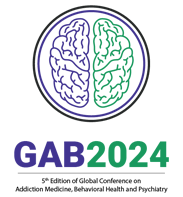Title : Ethical issues related to substance abuse in HIV patients
Abstract:
Ethics guides one to make a choice from the principle of what is right or wrong. Substance abuse involves both the provider and user. It can be also be personal and societal in nature. Morality and its legalization say “for public good” has to balance with the individual right such as “autonomy”.
It starts with labeling a person as “substance abuser,” which is not an easy choice to make as it may infringe upon the individual right’s autonomy. It is rather an intense emotional issue that transcends from personal to societal level. It clashes with personal values and beliefs including both religious and regional ones.
Drug or substance abuse is one of the major causes of HIV. Injection drug use (IDU) is one of the direct routes of HIV transmission. Up to 30 percent of global HIV infections are due to injecting drug use. Of an estimated 15.9 million people who inject drugs worldwide, up to 3 million are infected with HIV.
Such patients and their therapy involve ethical issues:
Some of the ethical issues that need to be addressed are
1. Duty to treat
Duty to treat requires the participation of the patient, counselor and the treating physician. The patient need to have access to medical insurance. The counselor must be available to advise and direct the patient to a particular therapist or an institution or tertiary care center. The Doctor must be willing to interact with an HIV infected person. It is a complex interaction between individuals and if there is an agency that needs to be taken into consideration.
2. Duty to warn
There has to be a trust built between the patient and the counselor. The counselor must have the capacity to inform the status of the patient to the partner or wife or husband. There are cases who knowingly infected multiple partners in spite of being warned of the status.
3. End of Life issues
A physician may face many complex situations where he or she has to deal with informing the patient about the prognosis, or to handle a patient who discontinues the treatment as it does not help him or her from recovering from the infection. The physician has to follow the code of conduct ethics or institution ethics in dealing with such situations to avoid legal implications.
4. Dual Relationships
The provider would have met the patient in a social context and also at a professional level. One needs to set boundaries when dealing with such situations.
5. Confidentiality
The core ethical principle is to keep the test result confidential. When it comes to confidentiality, one has to consider the situation whether he or she can tell the HIV status of patient to the partner or the family.
6. Scarce resources
Availability of resources including the provider, drugs as well as medical insurance will decide the treatment schedule of a patient with HIV.
Based on these ethical issues, the presentation will be focused.



